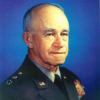Omar N. Bradley

Omar N. Bradley
General of the Army Omar Nelson Bradley, nicknamed Brad, was a highly distinguished senior officer of the United States Army who saw distinguished service in North Africa and Western Europe during World War II, and later became General of the Army. From the Normandy landings of June 6, 1944 through to the end of the war in Europe, Bradley had command of all U.S. ground forces invading Germany from the west; he ultimately commanded forty-three divisions and 1.3 million men,...
NationalityAmerican
ProfessionSoldier
Date of Birth12 February 1893
CountryUnited States of America
War: A wretched debasement of all the pretenses of civilization.
We know more about war than we know about peace, more about killing than we know about living.
Our technology has already outstripped our ability to control it.
Ours is a world of nuclear giants and ethical infants. We know more about war that we know about peace, more about killing that we know about living.
The way to win an atomic war is to make certain it never starts.
The world has achieved brilliance without conscience. Ours is a world of nuclear giants and ethical infants.
I am convinced that the best service a retired general can perform is to turn in his tongue along with his suit and to mothball his opinions.
Only one military organization can hold and gain ground in war-a ground army supported by tactical aviation with supply lines guarded by the navy.
Airpower has become predominant, both as a deterrent to war, and-in the eventuality of war-as the devastating force to destroy an enemy's potential and fatally undermine his will to wage war.
The greatest leader in the world could never win a campaign unless he understood the men he had to lead.
Every member of our baseball team at West Point became a general: this proves the value of team sports.
Peace is our goal but preparedness is the price we must pay.
As far as I am concerned, war itself is immoral.
Muddy language is not confined to policies alone. Each of you has seen replies to simple questions in which the meaning was lost through hopelessly obscure wording. When a person writes to the Veterans Administration, he is entitled to an easily understood, frank, and courteous reply. If our replies cannot be understood, they are not only not worth writing, but they simply create additional work.